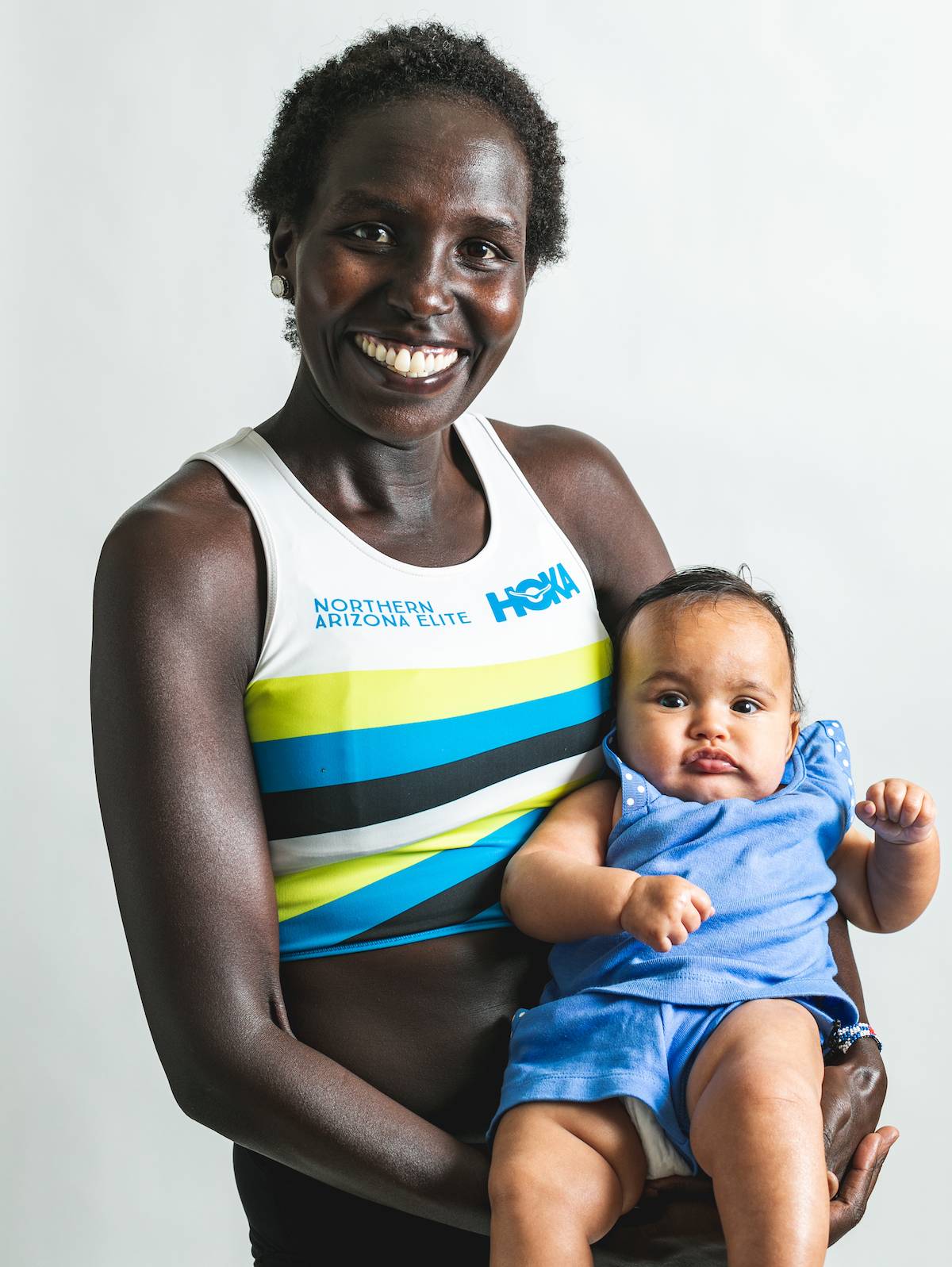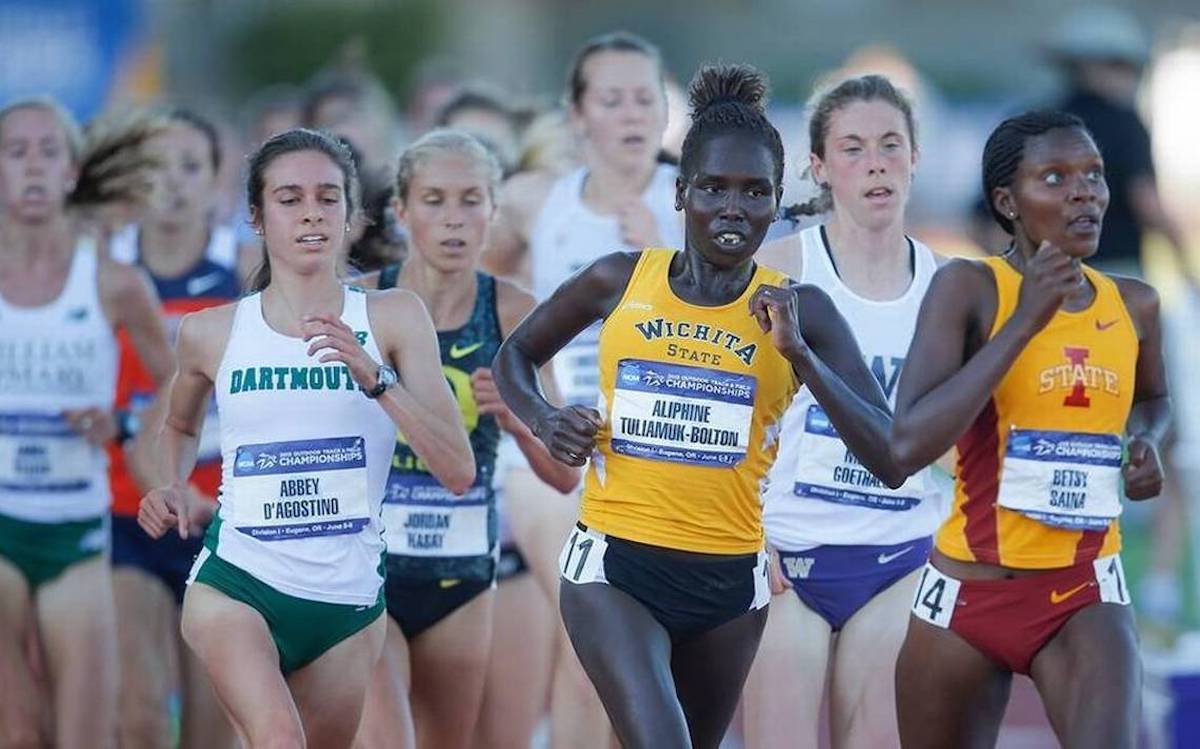 Courtesy photo
Courtesy photoAliphine Tuliamuk is in Japan with her daughter. She is sharing her biggest athletic moment with Zoe, born on Jan. 16, while breastfeeding.
Tuliamuk had to fight for this moment, to run the Olympic Marathon in Sapporo while caring for Zoe.
“A breastfeeding child is an extension of a mom,” Tuliamuk said last month. “There is absolutely no way you can separate a child who is nursing from their mother. It’s just not OK.”
Aliphine Tuliamuk won that fight. In late July, Olympic organizers allowed nursing children to accompany their mothers.
That is the Aliphine that Wichita State track and field coaches and her teammates knew during her time as an All-American distance runner. Resolute. Confident. Willing to push for what she wants or needs.
At 4 p.m. (CST) Friday, she runs in the Olympic Marathon. Tuliamuk, from Kenya, became an American citizen in 2016 after earning 13 NCAA All-American honors as a Shocker from 2011-2013.
Along the way, she cultivated a strong voice, advocating for herself and others.
“I’ve always been an outspoken person,” she said. “Before, I just didn’t have a platform. People listen, and I want to use it for the greater good.”
At Wichita State, she insisted on running in elite meets to help her development, a common practice in college track. She often trained with the men’s distance runners to push her to the level she desired.
She talked about the horrors of female genital mutilation and the poor state of healthcare in Kenya, issues that motivated her to go into nursing. When she earned U.S. citizenship, she talked about her pride in the United States and how much the country helped her life.
She is proud to inspire Black girls to see their future as a runner, a college athlete, an All-American or an Olympian. She said she regularly receives messages from girls expressing their gratitude for that example.
As a mother, she is using her status as an Olympian to nurture other female athletes, just as she leaned on athletes such as Kara Goucher and Stephanie Bruce. Tuliamuk trains with Northern Arizona Elite in Flagstaff, Arizona, along with former Shocker Kellyn Taylor. Taylor, who finished third in the NCAA Championships indoor mile in 2009, has an 11-year-old daughter named Kylyn.
“She realized she had a platform,” Taylor said. “She saw an issue and decided that ‘I have a voice and people will hear me and listen.’ That’s a great thing to do. Her dealing with her daughter in the Olympics was completely ridiculous, so I’m glad she spoke up.”
Olympic marathon runner
Tuliamuk grew close with Debbie and Mike Kennedy during her time as a Shocker. Debbie, a former nurse and teacher in the Wichita State School of Nursing, mentored Tuliamuk when her academic path changed from nursing to health services management and community development.
Mike, the radio voice of Shocker athletics, and Debbie traveled to Des Moines and Austin to watch Tuliamuk run in NCAA competition, and they remain close with her.
Debbie sees Tuliamuk’s voice as one cultivated by her family. She grew up as one of 32 siblings in a small village in Kenya.
“She was one of the oldest and had to help take care of the siblings,” Debbie said. “She became a guardian over so many different people. After she turned professional, she really started speaking out on disenfranchised individuals, particularly women, and representing them. She used her running ability to showcase her thoughts.”
Tuliamuk considers it her duty to provide a role model for women dealing with the uncertainty of competing in elite athletics while raising a child.
“Lucky for me, the women before me, they shared their experiences,” she said. “I am able to have much better support than the women before me.”
Tuliamuk finished sixth in the Fourth of July AJC Peachtree Road Race (10 kilometers), her first race since giving birth. She targeted 34 minutes and finished with a time of 32:43. Her performance there provided confidence in her fitness level.
“When you are a first-time mom and you are a pro athlete, your job depends on you being 100-percent healthy,” she said. “When you are in the process of becoming a mom, you just don’t know if you can do it. You don’t know what to expect. I want to share my story, because I want professional athletes to see what I did and know they can do it, too.”
Zoe’s presence in Japan is the most important part of Tuliamuk’s story.
“I’m running for my daughter,” she said. “Everything I do, I’m teaching her how to be a strong independent woman, how to overcome obstacles.”
To her coaches at Wichita State, Tuliamuk’s example is summed up by a cold February early morning in 2013 after an eight-hour bus ride from Cedar Falls, Iowa, to Wichita.
 File photo
File photoOver the preceding two days, Tuliamuk scored 28 points to lead Wichita State to the title at the Missouri Valley Conference Indoor Championships. She won the 3,000- and 5,000-meter runs and helped the distance medley relay team finish first. Hours before jumping on the bus, she finished second in the mile.
On the way back to Wichita, the weather report bothered her. Snow and ice threatened to stop her workout on Monday.
“I said ‘It looks like it’s going to hit at 3 a.m., right when we get back,’” said John Wise, assistant director of track and field. “She got immediately agitated. ‘When am I going to run? I need to run.’”
The snow held off a few hours. She ran the sidewalks and streets of Wichita after getting off the bus. When Wise called her the next morning, Tuliamuk had completed her 12-mile workout.
“I never wanted to make excuses,” she said. “I remember thinking I had to beat the snow. I was done by 6 a.m. Now I can just go to sleep and the snowstorm can come.”
That is, some say, what runners do. They need their routine and they need to run. Not all runners.
“I tell kids that all the time,” Wise said. “I go ‘You think are you into this. Are you this into it? Would you have done that?’ Some people are just built different. She wasn’t going to let the ice stop her.”

